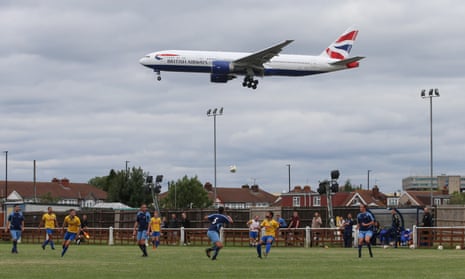On the face of it, Atlético Madrid have little in common with an amateur club in the 10th tier of English football. Although, if you look beyond the world-class players, their 68,000-capacity stadium and string of major trophies, Atléti have similar roots to British Airways FC of the Combined Counties Football League. Both sides once served as a leisure activity for airline workers. While BA’s club still carries the airline’s name, Atlético have given up the Athletic Aviacion de Madrid tag they carried from 1939 to 1947 after a merger with a team set up by members of the Spanish Air Force.
There are works teams throughout Europe. Manchester United fans may know their club used to be called Newton Heath, but perhaps some are not aware that the name originated from a group of employees who worked for the Carriage and Wagon department of the Lancashire and Yorkshire Railway. The team initially played fixtures against other departments and other rail companies – wearing green and gold – at North Road, a ground chosen more for its proximity to the railway than its suitability for football.
Arsenal are descended from a team formed by armaments factory workers in Woolwich (the club was originally called Dial Square as a reference to the sundial on top of the factory’s entrance) and West Ham were formed by a foreman at the Thames Ironworks and Shipbuilding Company.
Those clubs quickly evolved into elite-level sides around the turn of the 20th century, but the heyday for works teams in Europe came during the interwar years. With limited travel during that time, football clubs were regularly formed in places where lots of people gathered, such as neighbourhoods, churches or places of education.
It did not take long for companies to realise that leisure activities and sports teams were a good way of enticing new workers to their firms. The regular exercise afforded by such opportunities was also improved employees’ physical and mental well-being. Football pitches were the most common sight, but some larger companies built tennis courts, bowling greens and even rifle ranges to keep their workers in a positive frame of mind.

Their motives were not entirely altruistic, however. Businesses soon saw the value sport could have in promoting their brand, which in many cases led to an increase in investment in the side. Having a successful football team, it was reasoned, would attract publicity and custom. This sometimes led to clashes: should these sides be primarily for employees’ enjoyment or should they seek out the very best players possible to increase their chances of success?
It was not just the prospect of works teams drafting in ringers that caused controversy. Allegations that Morris Motors pressurised employees to play for its side rather than other clubs in Oxford irked rivals, who believed this monopoly went against the spirit of sporting competition. As football became increasingly professional, most works teams were either swallowed into insignificance or morphed into sides who only carried faint reminders of their origins.
It was a similar story on the continent, where a handful of big clubs were formed as employee sides. PSV Eindhoven have their roots in electronics company Philips; Bayer Leverkusen are the eponymous club of German pharmaceuticals company Bayer AG; and fellow Bundesliga team Wolfsburg were initially set up by Volkswagen workers.
Back in England, where a large non-league scene provides the platform for several weird and wonderful clubs, many former works teams still carry the names of their companies. As well as British Airways FC, a host of colliery teams represent the mining past of several northern towns. Stocksbridge Park Steels, whose roots go back to a works team for a local British Steel plant – still carry the company name in the Northern Premier League.

One of the most well-known examples of a former works team upsetting the odds is Vauxhall Motors FC. The side from Cheshire punched above their weight for a decade in the Conference North until they withdrew from the division in 2014 due to “low gates and ever-increasing costs”. Dig even further down the pyramid and it’s clear how football and society has changed. HSBC AFC, Civil Service FC and Ibis Eagles compete in the Southern Amateur League each weekend, but company workers only make up a small percentage of their squads.
The days of employees teaming up to face their rivals on a football pitch may now be consigned to Powerleague on a Tuesday night, but a few of the historic names live on.

Comments (…)
Sign in or create your Guardian account to join the discussion